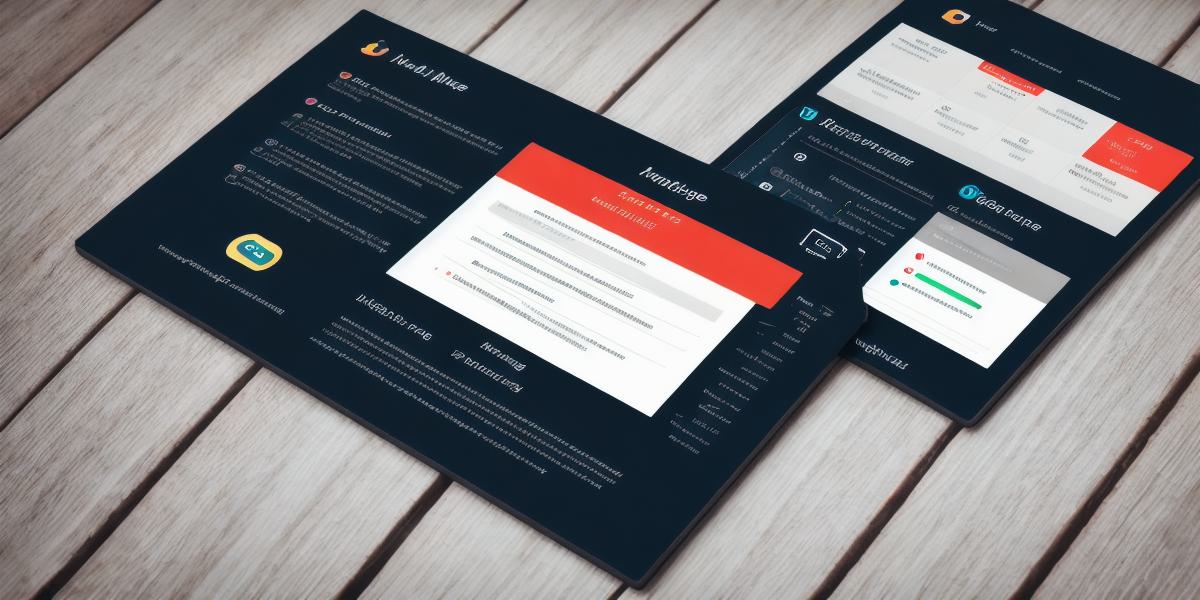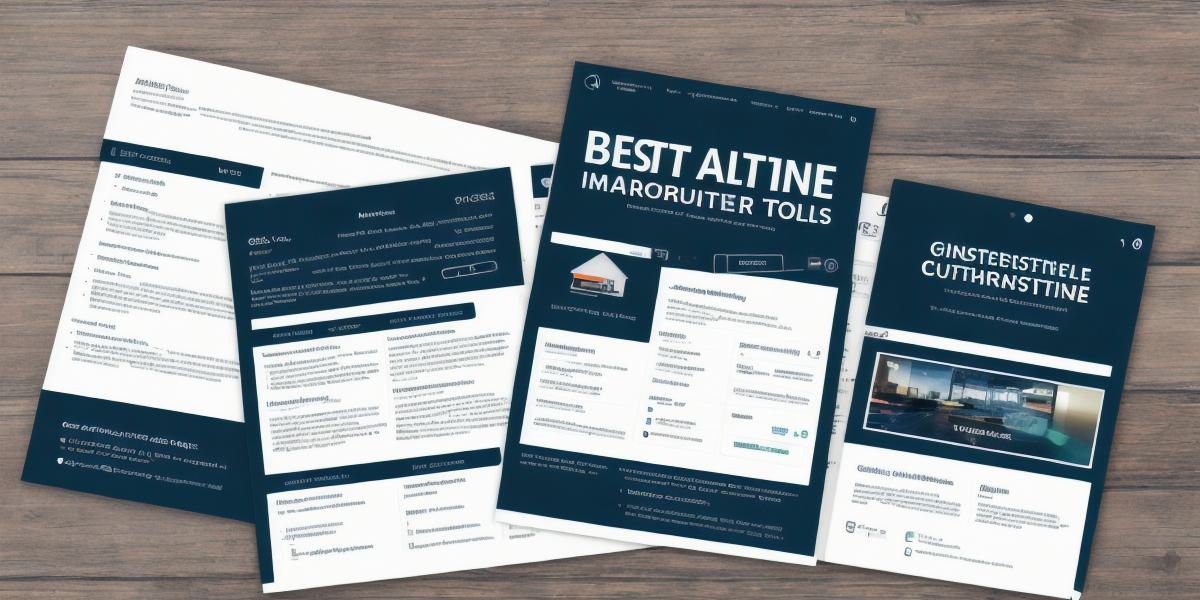In today’s digital age, marketing has become an essential component of any business strategy. With the rise of social media, email marketing, and other online platforms, marketers have more opportunities than ever before to connect with their target audiences and drive engagement. However, with so many tools available, it can be overwhelming for marketers to choose the right ones for their needs. In this article, we’ll take a closer look at the top 5 free digital marketing tools that every marketer should know about, along with tips on how to use them effectively.
1. Google Analytics: A Comprehensive Web Analytics Platform

Google Analytics is a powerful web analytics platform that allows marketers to track website traffic, user behavior, and other important metrics. With Google Analytics, marketers can gain insights into how their website is performing, identify areas for improvement, and measure the success of their marketing campaigns. Some of the key features of Google Analytics include:
- Traffic sources tracking: Google Analytics allows you to track traffic from various sources, including search engines, social media platforms, and email campaigns. This information can help you understand which channels are driving the most traffic to your website and adjust your marketing strategies accordingly.
- User behavior tracking: Google Analytics enables you to track user behavior on your website, such as bounce rates, time spent on page, and pages visited per session. By analyzing this data, you can gain a better understanding of how your website is engaging visitors and make improvements to improve user experience.
- Goal setting: Google Analytics allows you to set goals for your website, such as increasing conversions or reducing bounce rates. This information helps you measure the success of your marketing campaigns and adjust them accordingly.
2. Hootsuite Insights: A Social Media Management Tool
Hootsuite Insights is a social media management tool that allows marketers to schedule, manage, and analyze their social media campaigns. With Hootsuite Insights, you can monitor your social media metrics in real-time, track engagement, and measure the success of your campaigns. Some of the key features of Hootsuite Insights include:

- Social listening: Hootsuite Insights enables you to monitor conversations on social media platforms and respond to comments and messages. By actively engaging with your audience, you can build brand awareness and improve customer engagement.
- Post scheduling: Hootsuite Insights allows you to schedule posts across multiple social media platforms in advance. This helps you save time and ensures that your content is published consistently.
- Performance analysis: Hootsuite Insights provides detailed analytics on the performance of your social media campaigns, including reach, engagement, and conversions. By analyzing this data, you can identify areas for improvement and optimize your strategies for better results.
3. Mailchimp: An Email Marketing Platform
Mailchimp is an email marketing platform that allows marketers to create and send targeted email campaigns to their subscribers. With Mailchimp, you can segment your email list, design visually appealing emails, and track the success of your campaigns. Some of the key features of Mailchimp include:
- List segmentation: Mailchimp enables you to segment your email list based on various criteria, such as interests, behaviors, and demographics. By doing so, you can send targeted emails that are more likely to engage your audience.
- Email design tools: Mailchimp provides a range of email design tools that allow you to create visually appealing emails that match your brand’s style guide. With Mailchimp, you can choose from a variety of templates or upload your own custom designs.
- Performance analysis: Mailchimp provides detailed analytics on the performance of your email campaigns, including open rates, click-through rates, and conversion rates. By analyzing this data, you can identify areas for improvement and optimize your strategies for better results.
4. Canva: A Graphic Design Tool
Canva is a graphic design tool that allows marketers to create professional-looking graphics, flyers, and social media posts without the need for advanced design skills. With Canva, you can access a range of templates, images, and fonts that can be customized to match your brand’s style guide. Some of the key features of Canva include:
- Template library: Canva provides a vast library of templates that can be used for various types of marketing materials, including social media posts, flyers, and business cards.
- Customization options: Canva allows you to customize your graphics by adding text, images, and shapes. You can also choose from a range of colors and fonts that match your brand’s style guide.
- Collaboration tools: Canva provides collaboration tools that allow multiple team members to work on the same graphic design project simultaneously. This enables you to streamline your design process and ensure that everyone is on the same page.
5. Moz: A Search Engine Optimization Tool
Moz is a search engine optimization (SEO) tool that helps marketers optimize their website content for search engines. With Moz, you can analyze your website’s SEO performance, track keywords, and measure the success of your SEO campaigns. Some of the key features of Moz include:
- Keyword research: Moz provides a keyword research tool that allows you to identify relevant keywords for your business and track their search volume over time. By using these keywords in your content, you can improve your website’s visibility on search engines.
- Backlink analysis: Moz provides a backlink analysis tool that allows you to see which websites are linking to your website and the types of links they are using. This information helps you understand the quality and quantity of your backlinks and make improvements where necessary.
- SEO performance analysis: Moz provides an SEO performance analysis tool that shows how well your website is performing on search engines, including metrics such as keyword rankings, organic traffic, and search engine visibility. By analyzing this data, you can identify areas for improvement and optimize your strategies for better results.
Conclusion
Marketing in the digital age requires a range of tools to be effective. In this article, we’ve explored the top 5 free digital marketing tools that every marketer should know about. From web analytics and social media management to email marketing and graphic design, these tools can help you create effective marketing campaigns and improve your business’s online presence. By using these tools effectively, you can gain insights into your target audience, optimize your strategies for better results, and drive engagement with your brand. So go ahead and start experimenting with these tools today to see how they can help you achieve your marketing goals!
FAQs
1. What is the difference between Google Analytics and other web analytics platforms?
- While there are many web analytics platforms available, Google Analytics is one of the most popular due to its integration with other Google products such as AdWords and Search Console. It also provides detailed insights into website traffic, user behavior, and goal conversions that can help marketers make data-driven decisions.
2. Can I use Hootsuite Insights for social media advertising?
- Yes, Hootsuite Insights allows you to manage and analyze your social media advertising campaigns alongside your organic content. You can view ad performance metrics, such as reach, engagement, and conversions, and optimize your ad campaigns for better results.
3. What is the best way to segment my email list in Mailchimp?
- The best way to segment your email list in Mailchimp depends on your business goals and audience. You can segment your list based on various criteria such as interests, behaviors, demographics, and purchase history. By doing so, you can send targeted emails that are more likely to engage your audience.
4. Can I use Canva for print marketing materials?
- Yes, Canva provides templates and customization options that can be used for print marketing materials such as business cards, flyers, and brochures. However, it’s important to ensure that your designs are optimized for print media and comply with any relevant printing standards.
5. What is the purpose of Moz’s keyword research tool?
- The purpose of Moz’s keyword research tool is to help marketers identify relevant keywords for their business and track their search volume over time. By using these keywords in their content, they can improve their website’s visibility on search engines and attract more organic traffic to their site.




